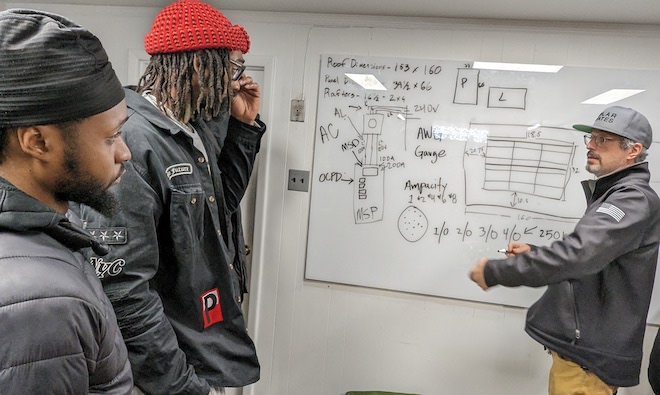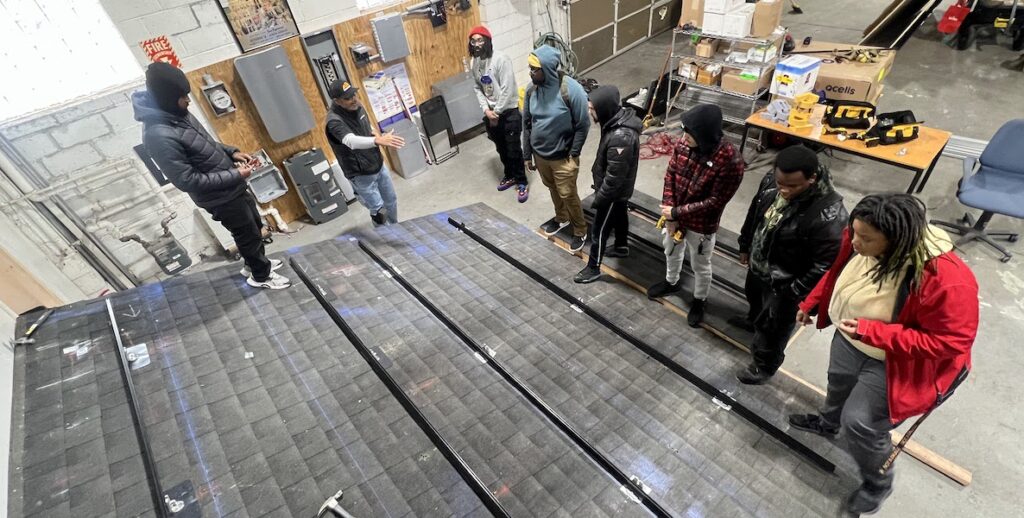Growing up in a communal household in West Philly, Micah Gold-Markel remembers how handy and helpful many of his neighbors were. If you needed a window repaired or your house painted, there were plenty of people willing and able.
Many were doing construction-related work on an ad-hoc basis, without the certifications required for stable industry jobs. Others struggled to find employment because of prior interactions with the justice system.
“So many people I grew up with had side hustles — fixing a door, putting in a kitchen sink — but they never worked at the large construction companies where they would have benefits and paid time off,” Gold-Markel says.
So when Gold-Markel found himself at a career crossroads in 2008, he thought about the people he knew growing up. Sitting in a talk by human rights activist and environmental leader Van Jones on the Green Economy, he had an epiphany: He could create the kinds of family-sustaining jobs in construction that he wished for his neighbors.
He launched his solar panel installation and training company, Solar States, shortly after. Today, Solar States is training people for the kinds of jobs he envisioned while sitting in the crowd at Van Jones’ lecture. Over the years, the company has worked on over 1,200 solar installation projects and trained over 400 adults for jobs across six programs, some run on their own and some in partnership with PECO, PowerCorps PHL, OIC and others.
In January — six years after The Citizen first wrote about the company — Solar States launched a new paid training program, Find Your Ladder, as part of the Department of Commerce’s Fair Chance Hiring Workforce Solutions Grant initiative, funded by more than $226,000 from the City.

Solar installation training programs for all
Solar States didn’t start out to create a training program for those impacted by the justice system. When he first started the company, Gold-Markel needed to focus on smaller goals. Namely, teaching himself about solar panel installation. At the time, he was working a desk job as a software engineer. Before that, he was a hip-hop promoter who represented Schoolly D. He had no idea what it would take to launch a solar panel installation company.
But he was driven by a sense of purpose. He was a new father. President Obama had just been elected. Things felt hopeful, and he wanted a job that allowed him to make change, not just watch it happen. Solar panels seemed like the obvious place to start. If we’re going to convert our electrical grid and zero out carbon emissions, he figured, we’ll need people to install them.
And those people are in demand. Since 2015, the need for workers with green skills has risen 40 percent globally, according to the World Economic Forum. In the U.S., 39 percent of homeowners say they “have given serious thought” to installing solar panels, per a 2022 Pew Research Center survey.
“We have a unique opportunity to connect the dots and bring a smart, engaged, motivated, skilled workforce to be the first to benefit from the clean energy transition.” — Emily Schapira, Philadelphia Energy Authority
Why couldn’t Philly be part of the solution?
Gold-Markel immersed himself in the industry. He started studying photovoltaic energy, training as an electrician, and drafting a business plan for Solar States, which he envisioned as a solar panel installation and vocational training company. At the same time, he was hustling to fund the business. After banks rejected his loan applications, he raised $250,000 from friends and family, another $250,000 from grants and a loan from a private equity investor.
“I got hands-on training. I worked with various electricians, and I realized that what I wanted to do was hands-on training for people, because that’s how I learned best,” he says.
So, he started teaching solar panel installation as a volunteer at YouthBuild charter school. He now looks back and remembers those times as some of the best, and busiest, of his life. “I was constantly working so hard. I had a young family. But also I was doing what I loved,” he says.
Three years after he first got the idea for Solar States, the company installed its first set of panels on the Crane Arts building while partnering with other organizations to teach solar panel installation.
Soon after, Solar States launched their own training program called Find Your Power, which helped trainees obtain their OSHA 30 certificate, which educates them on the necessary health and safety standards for working in solar. Now, the company has grown to 50 employees, several of them former trainees, a headquarters in Olde Kensington and a training warehouse in Bridesberg.
Jobs, jobs, jobs
Gold-Markel saw a new opportunity for his company in the City’s Fair Chance Hiring Workforce Solutions Grant, a program that supports organizations in implementing year-long training programs for justice-impacted individuals. It’s part of the broader Workforce Solutions Grant initiative, which aims to create job opportunities for underemployed Philadelphians.
Solar States’ training program’s name — Find Your Ladder — comes from the idea that if trainees get a foot in the solar panel installation industry, they’ll be able climb the career ladder to better positions. “It’s not enough to just get an entry level job in solar,” Gold-Markel says. “What we want to see you do is climb that ladder to success.” Find Your Ladder kicked off this January with a cohort of about a dozen trainees who are between 18 and 30 years old and have been involved with the justice system in some way.
Over the next eight to 10 weeks, trainees will install panels on a mock roof at Solar States’ warehouse. They’ll also work on an electrical wall to learn how to wire houses for solar energy, and they’ll learn the science behind these technologies. At the end, trainees complete an internship with a solar panel installation company and earn credits toward obtaining an OSHA 30 certificate or a North American Board of Certified Energy Practitioners photovoltaic energy associates certificate, serious credentials that can help them become professional solar panel installers.
“I got hands-on training. I worked with various electricians, and I realized that what I wanted to do was hands-on training for people, because that’s how I learned best.” — Micah Gold-Markel, Solar States
The program pays participants $15 per hour for training sessions and provides them with free SEPTA passes, so that they can get to their classes without incurring an additional financial burden. Once they complete the training, they can earn between $18 to $30 an hour working in the industry. Solar States pays its workers $18 per hour and guarantees a minimum of a 28-hour work week — a crucial benefit, since panel installation tends to be seasonal. They also contribute to a 401k plan and offer health insurance benefits.
“I understand the life of an installer — how hard it is and how tough it is. It’s cold outside. It’s super hot outside. You’re working on tall ladders. You’re doing all sorts of physically demanding work, but it can lead you to better things,” Gold-Markel says.
Isaiah “Zay” Smith has been able to build a career in solar after receiving training through Solar States. He studied biology and environmental sustainability at Philadelphia University and had been working at Pfizer. During the pandemic Smith decided to make a career pivot to renewable energy. So in 2022, he pursued certification through a Solar States training held in partnership with ECA – Solar Training Lab. He started working there as a technician shortly after.
Smith was soon able to progress from a service technician to a project designer, and he now works with the company’s consultants to design solar arrays for customers. “It gives you the ability to start a career — whether you’re coming out of high school or if you have a college degree and you want to change career paths,” he says.
Smith is far from the only Solar States employee who’s been able to make that transition. “We’ve had people who’ve been with us now for five, eight years, “ says Gold-Markel. “They started out knowing absolutely nothing about solar. A lot of folks didn’t even know solar power was an industry, and now they’re leading teams.”
The future of Find Your Ladder
The Find Your Ladder program is still too new for Solar States to know how successful it will be. The first cohort of trainees will finish their education in March; the second will finish in May. The company points to its previous training programs — Find Your Power, the youth and adult Bright Solar Futures programs they developed with the Philadelphia Energy Authority and offered through Frankford High School — to demonstrate its track record in creating value for participants and for Philadelphia.
“Solar States was an integral partner in Bright Solar Futures curriculum development for both our high school and adult programs,” says Emily Schapira, president and CEO of the Philadelphia Energy Authority. “The clean energy industry, along with construction and many other trades, has struggled with labor shortages while the industry is booming. At the same time, the unemployment rate among young Black men in Philly is typically two to three times the citywide average. The disconnect has really exacerbated and entrenched poverty and inequity, so we have a unique opportunity to connect the dots and bring a smart, engaged, motivated, skilled workforce to be the first to benefit from the clean energy transition.”
“We’ve had people who’ve been with us now for five, eight years … A lot of them didn’t even know solar power was an industry, and now they’re leading teams.” — Gold-Markel
The future of Find Your Ladder remains uncertain, since it will only be able to continue if Solar States receives additional grant funding to sustain it. Still, the company plans to continue growing its efforts. Solar States is on track to hit $10 million in revenue this year from a mix of residential and commercial projects. Currently licensed to work in Pennsylvania, New York and New Jersey, the company has its sights set on installing solar arrays in Delaware next.
Those metrics are important for the company’s bottom line, of course, but also for its ability to provide opportunities for people — some of whom often face very limited options — to build real and meaningful careers, says Gold-Markel.
He remembers one man, nicknamed Quil, who had participated in one of their training programs after being incarcerated. He was a good student, but before he could complete the training, he was arrested again after a cop found a gun in his car. Gold-Markel is still in touch with him and hopes that he’ll rejoin the training once he’s released.
“He wrote me a letter the other day, and he talked about what it meant to him to have the experience while he was out and how disappointed he was in himself that he got incarcerated again; it was very touching,” Gold-Markel says. “Hopefully, we made a difference in his life in a way that if he gets back out he will remember what it felt like to be in solar and get back to it.”

